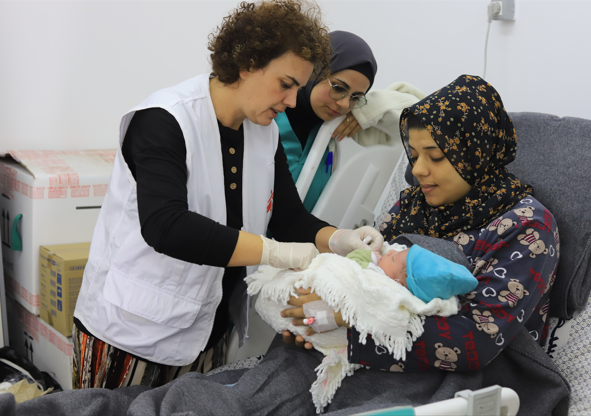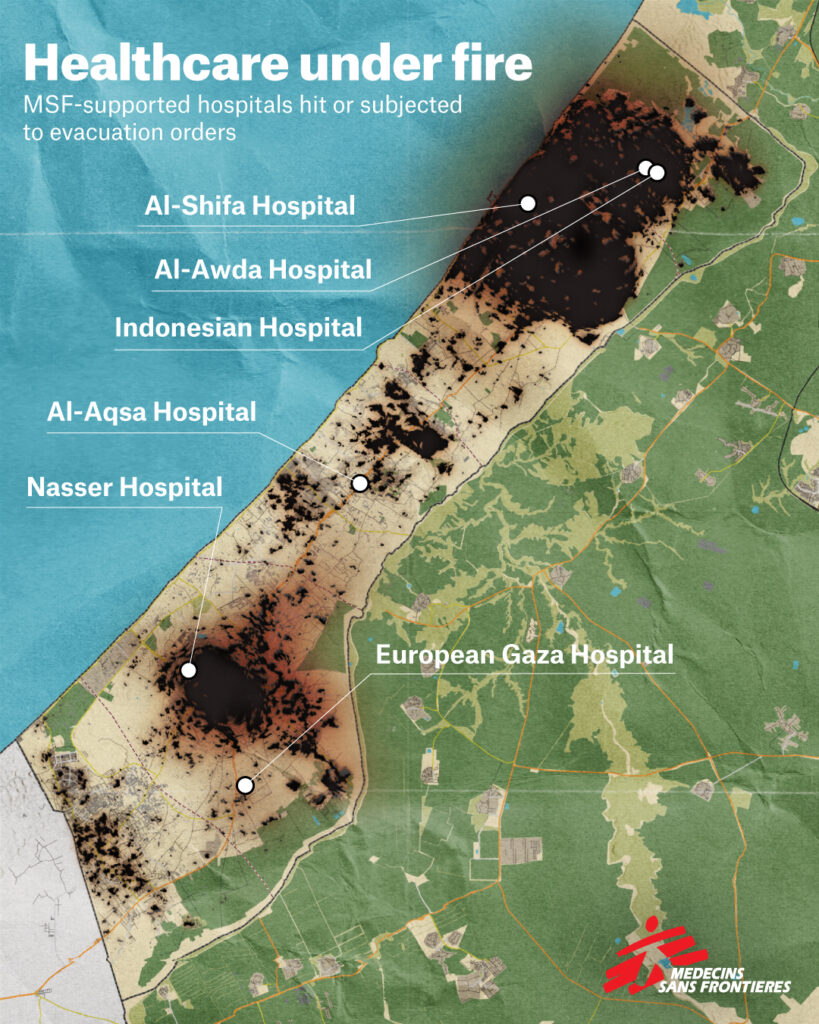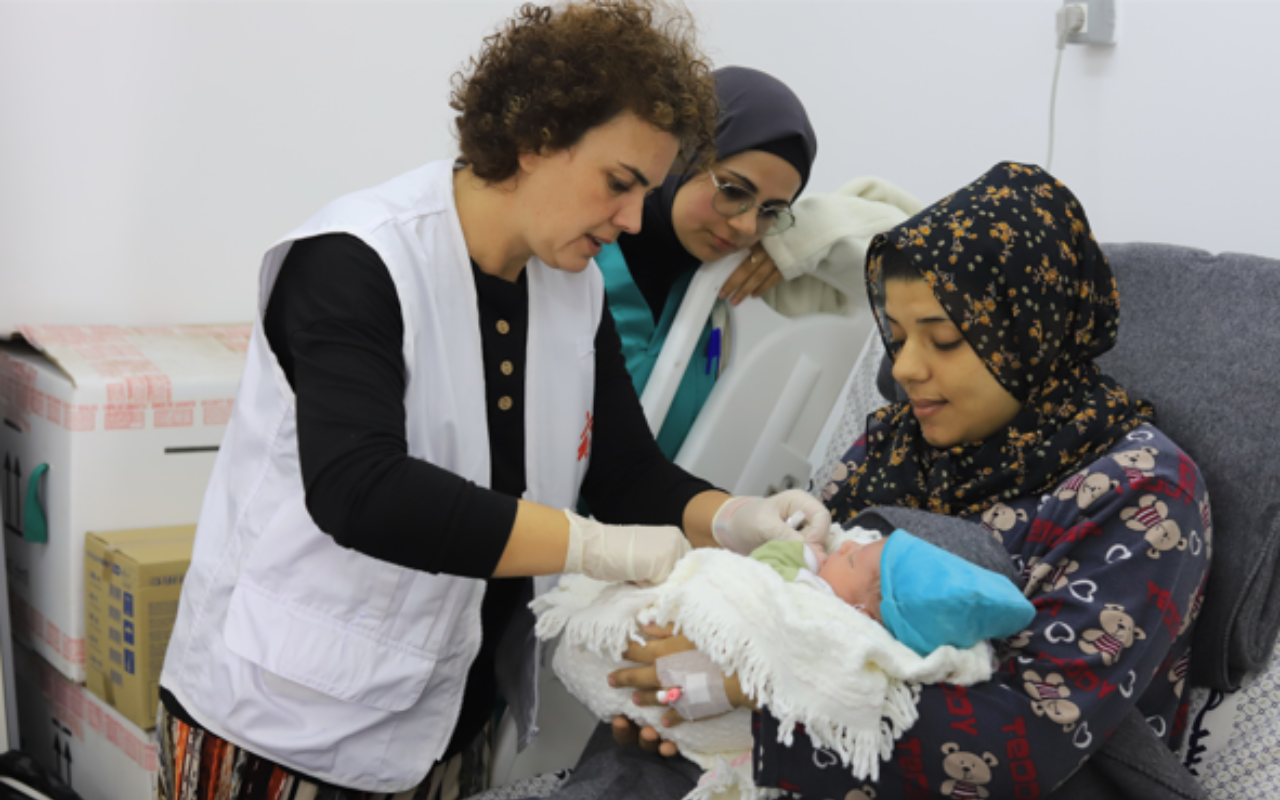As negotiations continue on a possible ceasefire in Gaza, intense fighting has brought the health system in the region to near collapse.
The alarm bell continues to sound on the health care situation in Gaza, with Médecins sans Frontières (MSF) warning that civilians in southern Gaza are running out of health care options.
Medical services have reportedly “collapsed” at Nasser hospital, which is the largest functioning health facility in Khan Younis in south Gaza, according to MSF.
“Most of the hospital’s staff, along with thousands of displaced people who had sought shelter in the hospital, fled in the days leading up to the evacuation order of the surrounding areas by Israeli forces,” MSF said in a statement.
“The hospital’s surgical capacity is now almost non-existent, and the handful of medical staff remaining in the hospital must contend with very low supplies that are insufficient to handle mass casualty events — large influxes of wounded people.”
More than 300–350 patients remain at Nasser hospital and are unable to evacuate because the situation remains too dangerous and there are no ambulances.
“These patients have war-related injuries such as open wounds, lacerations from explosions, fractures, and burns,” MSF said.
“On 24 January, at least one patient at the hospital died because there was no orthopaedic surgeon available.”
MSF’s medical coordinator in Palestine, Guillemette Thomas, said the European Gaza Hospital in Khan Yunis is also not functioning properly.
“People’s lives are at risk because of the lack of medical care,” Mr Thomas said. “With Nasser and European Gaza Hospital almost inaccessible, there is no longer a healthcare system in Gaza.”

The rising toll
The conflict began on 7 October 2023 when Hamas militants attacked southern Israel, killing 1200 people in Israel and taking 250 people as hostages. About 130 people are still being held hostage, while some are believed to have already been killed.
Gaza’s Health Ministry said earlier this month that 27 019 Palestinians have been killed and 66 139 have been wounded since the conflict began.
“[The Ministry] does not distinguish between civilian and combatant deaths but says most of those killed were women and children,” ABC News America reported.
In addition, 138 Palestinian and nine Israeli health care staff have reportedly been killed (here), but other estimates put that number as high as 300.
At least 212 Palestinian health care staff have been arrested, although the figures may be underestimates because of the “sheer volume of incidents” and the difficulties in verifying this information, the BMJ said.
Doctors facing difficult conditions
Doctors working in Gaza have told of the difficulties of maintaining contact with medical colleagues, due to frequent communication blackouts caused by ongoing military attacks.
Medical professionals in the region have told the United States’ NPR that “there is little time to mourn the dead or ensure their legacies are not buried in the destruction of the violence of war”.
The conflict is particularly distressing for doctors because of the number of civilians caught up in the bombardment, the MSF’s temporary Head of Mission in Palestine, Anne Taylor, said.
“I have worked in conflict zones,” Ms Taylor, who was temporarily posted to Jerusalem late last year, told The New Yorker.
“And they’re always very nasty. But this is a particularly brutal thing because of the huge number of civilian casualties. And they can’t escape it. They can’t move. They’re told to displace down south.
“But are we talking about just reducing the area from forty-five kilometres to twenty kilometres in length and trying to put two million people in there, which is … It’s just an extraordinary situation.”
Anne Taylor, who is originally from Wellington, New Zealand, has undertaken 19 field assignments with MSF.

The spread of disease
In recent weeks, fighting has been intense in areas around Khan Younis, prompting the United Nations Relief and Works Agency for Palestine Refugees (UNRWA) to move its operations.
“We’ve lost a health clinic, major shelters — facilities that were supporting the people of Khan Younis,” UNRWA’s Thomas White said.
Diseases such as hepatitis A, jaundice and respiratory infections are reportedly spreading in parts of Gaza, partly because of people living in overcrowded and wintery conditions. Heavy rain, gusting winds and cooler temperatures have left many families struggling to find blankets to stay warm, the United Nations Children’s Fund (UNICEF) said.
Situation “very concerning”
The Medical Journal of Australia’s Editor-in-Chief, Professor Virginia Barbour, said the situation was very concerning.
“Doctors and other health care workers in Gaza are struggling in appalling conditions to provide even the most basic health care to innocent people caught up in this terrible conflict,” Professor Barbour said.
“This population is already suffering with lack of access to shelter, food and even water, leading to catastrophic health conditions. We have a duty as medical professionals to support and advocate for the provision of health care in a time of war, especially, as in this conflict, when the civilian population is unable to escape. We recognise the bravery of the many health care professionals who are continuing to provide care in incredibly difficult circumstances.
“The MJA echoes recent statements by the Australian Medical Association (AMA) and the World Medical Association that all parties respect the principles of medical neutrality, allow medical care to take place, and that innocent people be safeguarded.”
In a statement published when the conflict began, the World Medical Association said it stood firmly for the principles of medical neutrality and mourned the loss of lives in Gaza, particularly the medical personnel caught up in the conflict.
The AMA has also called on all parties involved in the conflict to respect the principles of medical neutrality during times of armed conflict.
“The AMA recognises the conflict and ensuing humanitarian crisis is causing great distress amongst healthcare workers in Australia and around the world,” the AMA said in a recent statement.
“AMA members wondering how to help and support humanitarian efforts in Gaza may wish to consider donating to organisations such as the International Committee of the Red Cross (ICRC) and [MSF], both of which are actively on the ground providing assistance and relief to those in need.”
At the time of writing, negotiations continued over a possible six-week truce, which may allow medical care to be provided to civilian populations and enable Israeli hostages to be exchanged for Palestinian prisoners.
Subscribe to the free InSight+ weekly newsletter here. It is available to all readers, not just registered medical practitioners.

 more_vert
more_vert